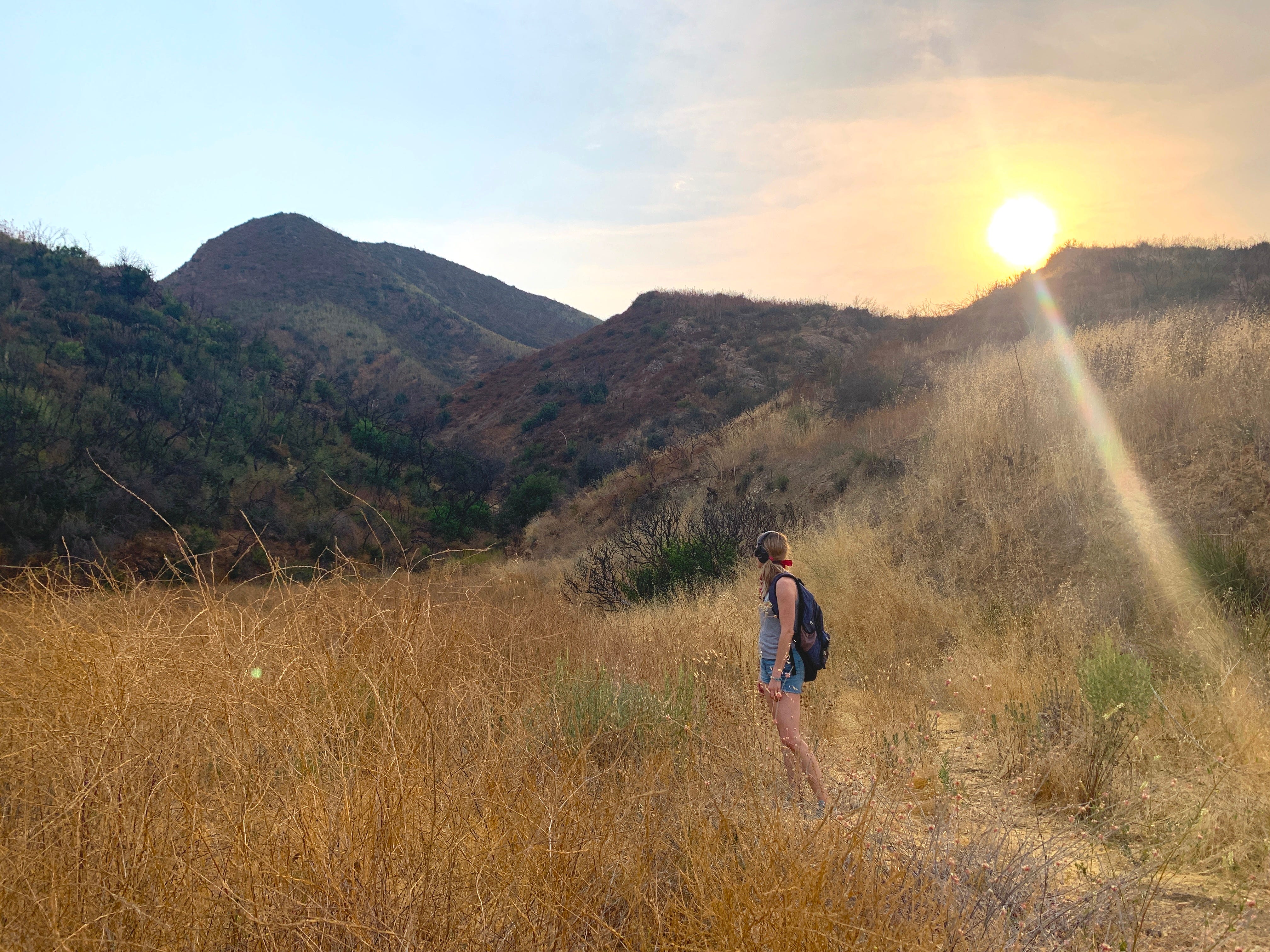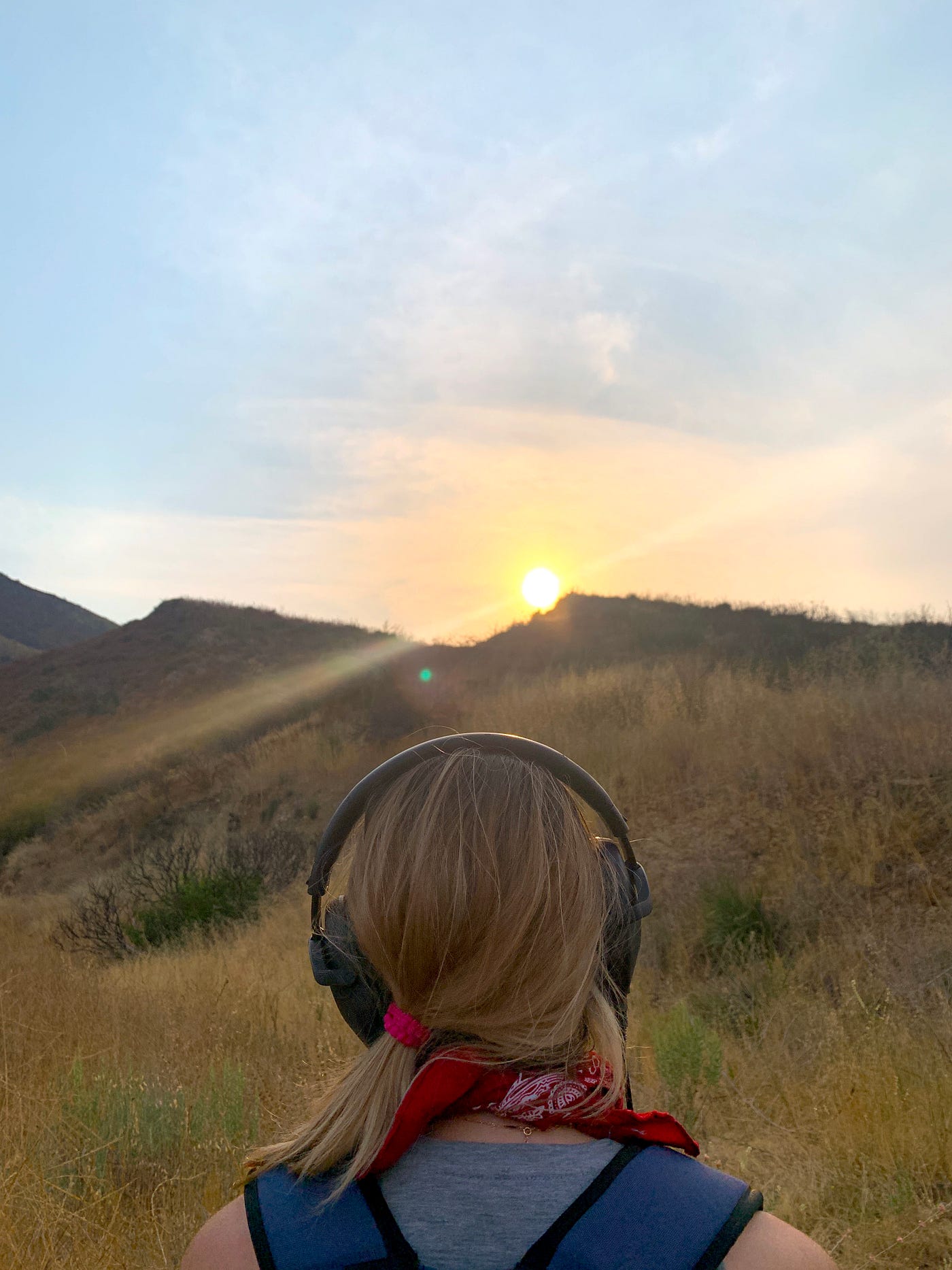Marking Meaning In ‘Fire Season’ (Q&A)
LA’s Capital W returns with a socially distanced exploration of the impacts of climate change


Capital W is one of Los Angeles’ premiere immersive theatre companies, having first made their mark with the award winning Hamlet-Mobile in the early days of the immersive renaissance in LA and have gone on to produce envelope pushing work in Southland and Denver.
After conducting a series of remote experiments at the beginning of the pandemic, the team is back with their first socially distanced production FIRE SEASON. The new show has been developed to take place in the Santa Monica Mountains, with eight audience members listening to a live performance by creator Monica Miklas of her original prose as they move through the site of a recent wildfire burn.
This is Capital W’s first major production with Miklas in the role of writer-performer, the co-founder having previously put herself in the producer role. It also tackles a topic — the ecological damage that climate change is inflicting — that has fresh immediacy as the West Coast endures its worst fire season in years.
General admission tickets for the show are set to drop soon, but before then the company is raising money to cover the cost of the National Parks Service’s permitting fee, looking for donations and running a pre-sale.
We caught up with Miklas and Capital W co-founder Lauren Ludwig through the modern miracle of email.
No Proscenium: We’re in the middle of what’s already been a terrible fire season here in California, yet this piece was set in motion long before. Could you tell us what put this project into motion?
Monica Miklas: The last four fire seasons have been horrific for California. You just can’t get away from it. In 2017, my parents’ home was threatened by the Thomas Fire and suddenly this existential, abstract threat was personal. They had moments to leave and we really didn’t know if they were ever going to see the house again. That uncertainty lasted for days. Luckily for us their house was undamaged, but homes on their street and on the next block burned down.
Amidst the backdrop of these terrifying fire seasons, writing about nature and the changing climate has felt almost like a compulsion. I have to do it. My climate anxiety has to find a way out into the open; it forms the subtext to everything I write. As we contemplated this project and dug into the texts I’d generated, we realized how many of them featured fire as a central motif — and a metaphor for the climate crisis itself.

NP: Prior to this interview we’ve talked about how FIRE SEASON is a reflection on both climate change and how things progress through generations. What is it about these two themes that moves you to entwine them?
Lauren Ludwig: When Monica first showed me the pieces that eventually formed FIRE SEASON, I was struck by the seamless way she was weaving together the personal, societal, and ecological. The writing collapses the distance between our own changing lives and the larger changes of the planet across history. By interrogating all the things we inherit from the generations before us — be they limiting stories about gender, motherhood, and sexuality or an ever-hotter planet — the piece cracks open space for the audience to ask, “What do I want to do with what I was given?”
Get No Proscenium’s stories in your inbox
Join Medium for free to get updates from this writer.
SubscribeSubscribe
MM: I’ve long thought that a barrier to action on climate change is that people don’t want to admit their complicity in causing it, even if it was unwitting, because the shame is overwhelming. Many of us were told that meat is good for you and that we’re lucky to have it. We were told that disposable everything is clean and efficient. We don’t need to blame ourselves for picking up those ideas from previous generations, because how could we help it? But we can — and we must — take responsibility for our inheritance, and question whether those are the values that we want to send forward into the future.
LL: We want to introduce another emotional thread to the climate narrative besides shame. Shame is debilitating — it prevents people from acknowledging the problem and taking action. Hope, resolve, joy, awe — these feelings need a seat at the table. We want people leaving the show spurred to take clear action that makes sense to them.
NP: Development in the piece started pre-pandemic. How did the current crisis shape this piece about the larger crisis?
MM: It’s funny, I had a moment early in the pandemic when I thought that we couldn’t possibly do this show this year. How could we talk about anything but covid? Wasn’t that irresponsible? And then I thought the same thing when the national conversation shifted to racial justice in the wake of George Floyd’s murder. But that feeling of ping-ponging from one issue to the next was exactly the reason to stay the course on a project about climate in 2020. Climate change, covid, racial justice — these are intersecting and overlapping catastrophes.
LL: In the most recent issue of The Atlantic, Ed Yong wrote that as humans encroach upon the territories of wild animals, we amp up the risk of “spillover” of viruses. Climate change damages habitats and the process speeds up. Likewise, one of the drivers of California’s fire risk is the development of these same urban-wildland interfaces. And anybody paying attention could guess that the poor and people who face systemic racism are disproportionately affected by climate change. That’s what environmental justice is about — the connection between these issues.
NP: This piece is new ground for the company in a few ways, with producer Monica Miklas stepping into a writer/performer role. Could you tell us what spurred that transition?
MM: As a child, I identified strongly as a writer. I wrote all the time and I performed, too. But somewhere along the path to adulthood I lost that confidence. I started to think of myself as a “business” type: the person behind the scenes who’s enabling the real artists to do their thing. I was ignoring a big part of myself, I think in no small part because I didn’t have a good handle on the anxiety and depression that are a part of my journey through this life.
A few years ago I started taking my mental health more seriously and as part of that process, I started learning to trust my own voice as an artist again. Lauren has been instrumental in pushing me to be honest with myself — and with her — about what I need from our work in Capital W, and about what moves me. I feel like I’ve recaptured some of the hope and sense of possibility that I had as a creative child.
LL: The Capital W development processes are always deeply collaborative. Monica was a dramaturg and creative producer on our past shows and her input was essential, so I was not shocked — and was very delighted — when Monica announced she wanted to write an immersive piece. I think the surprising part is the unique nature of her voice. Monica’s writing is both poetic and grounded. It’s highly intelligent and strikingly emotional. It’s a really incredible balance. I love the way she uses images to personalize the earth and climate. It makes the show feel quintessentially Capital W, in that it creates an intimate connection between each audience member and their scene partner — in this case, the land.
MM: When people see this show and think about climate change, I want them to feel like a lover is in peril. I want them to feel their direct emotional connection to the earth — and act upon it. That’s been our north star throughout the process.
FIRE SEASON will take place on weekends in October, with tickets on sale later this month.
NoPro is a labor of love made possible by our generous Patreon backers. Join them today!
In addition to the No Proscenium web site, our podcast, and our newsletters, you can find NoPro on Twitter, Facebook, YouTube, Instagram, in the Facebook community Everything Immersive, and on our Slack forum.
Office facilities provided by Thymele Arts, in Los Angeles, CA.